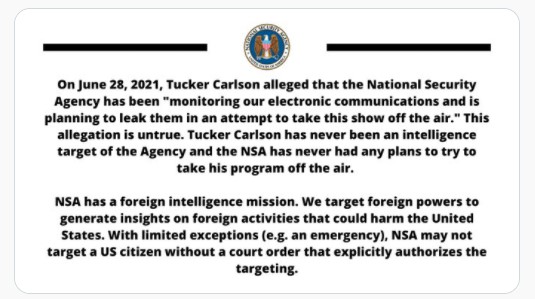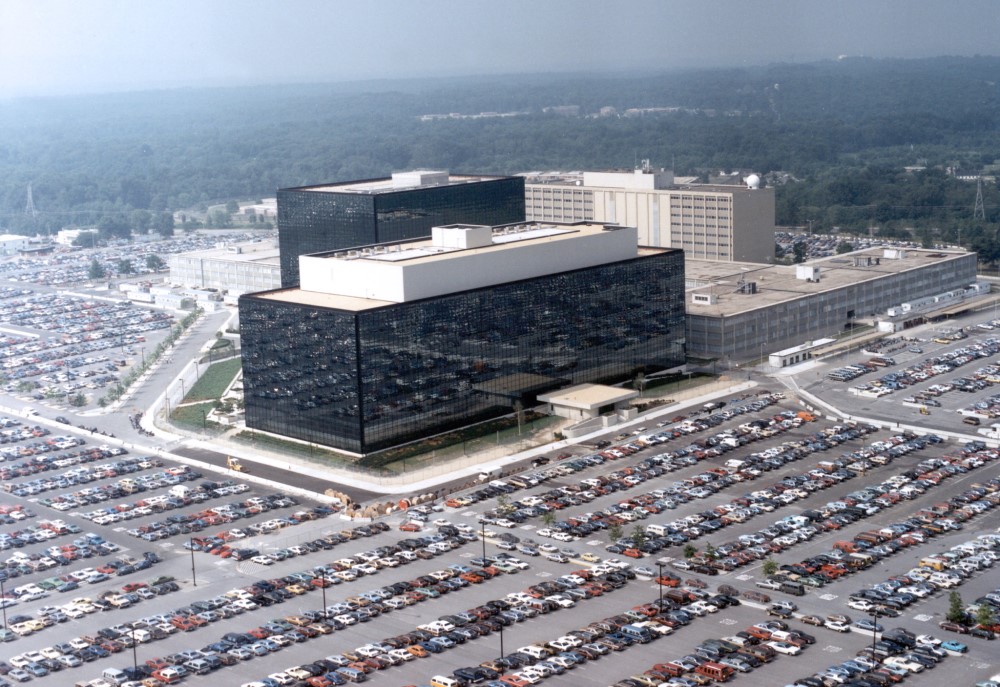By Fred Fleitz
I laughed when Fox News host Tucker Carlson said a National Security Agency (NSA) whistleblower told him that agency was monitoring his emails to leak them in an attempt to take his show off the air. From my 19 years as a CIA analyst and five years with House Intelligence Committee staff, I found this impossible to believe, for three reasons.
First, I believed NSA’s huge and lumbering bureaucracy would never agree to such a flagrant violation of the agency’s foreign intelligence charter to spy on a leading conservative American journalist. Even if most NSA officials and analysts dislike Carlson, I assumed they would view violating NSA rules and the law to monitor him as too risky, since a leak was certain given how extremely controversial such an action would be and the large number of NSA personnel who would know about it.
Second, the NSA spying on Carlson would have to be approved at the highest level of the Biden administration—probably by National Security Adviser Jake Sullivan. I believed Sullivan and other senior Biden officials were too risk-adverse to order NSA surveillance of Carlson. Third, I have little regard for high-profile NSA whistleblowers, too many of whom have been disgruntled former employees pursuing personal agendas.
I therefore dismissed Carlson’s claim that the NSA was reading his emails. Then I saw this extraordinary denial from the NSA:

Carlson rejected this explanation by calling it “an infuriating, dishonest formal statement.” He added, “Last night on this show, we made a very straightforward claim: NSA has read my private emails without my permission. Period,” Carlson stated. “That’s what we said. Tonight’s statement from the NSA does not deny that.”
In a tweet, Rep. Justin Amash, R-Michigan, a longtime critic of NSA, also sharply criticized NSA’s response, saying: “Don’t know whether NSA is *specifically* spying on Carlson, but this statement is worthless. 1st, it denies a compound allegation re ‘monitoring’ *and* taking show off air. 2nd, it says he’s not a ‘target,’ which is a term of art. Real danger is so-called ‘incidental collection.’”
Let’s be very clear about what the NSA said in its statement. It denied “targeting” Carlson, but did not deny reading his emails. The NSA also did not deny that it may have accessed Carlson’s communications through “incidental collection.”
These were huge omissions, since incidental collection is a well-known and controversial way the NSA collects vast amounts of Americans’ communications without warrants. This happens when an innocent American communicates with a legitimate NSA target, such as someone believed to be under the control of or to be collaborating with a hostile foreign power.
When this happens, the name of the innocent American is supposed to be “redacted” or masked. There are very strict rules on how incidentally collected communications of U.S citizens can be used.
Given the controversy that arose from Obama officials requesting the names of Trump campaign officials be “unmasked” in 2016, tougher rules were enacted to protect the identities of the communications of Americans that the NSA incidentally collected. In addition, in 2017 the NSA claims it ended its controversial “upstream collection” surveillance practice of collecting email traffic of American citizens merely because it contained an email address or phone number of a foreign target.
The NSA’s non-denial of Carlson’s allegations therefore raises some serious questions. Why did the NSA not flatly state it never accessed Carlson’s communications? Were Carlson’s communications “unmasked” at the request of White House officials?
Susan Rice admitted she unmasked Trump campaign aides during the Obama administration and now serves in the Biden White House. Has Rice resumed her previous efforts to weaponize NSA reporting against the political enemies of another Democratic president?
A more troubling question is whether this story, if true, indicates that NSA did not actually halt its “upstream collection” of emails, as it claimed in 2017.
So in response to the NSA statement, I admit that I may have been wrong and Carlson may be right. The NSA only denied Carlson was an intelligence target. It did not deny reading his emails or violating his privacy rights.
I was therefore pleased to learn that last Wednesday, House Minority Leader Kevin McCarthy, R-California, asked House Intelligence Committee Ranking Member Devin Nunes, R-California, to probe the allegation that NSA is spying on Carlson and other reports that NSA is being politicized. In his statement, McCarthy said he has seen “disturbing trend . . . [f]or the past several months” at NSA.
Stories like this undermine Americans’ faith in their government and the integrity of our foreign intelligence agencies, which exist to defend our nation against hostile foreign powers. For the good of the country, NSA needs to issue a better explanation ASAP either denying that it read Carlson’s emails or provide an explanation for what actually happened.
Fred Fleitz is president and CEO of the Center for Security Policy. He served in 2018 as deputy assistant to the president and chief of staff of the National Security Council. Fleitz held national security jobs for 25 years with the CIA, DIA, Department of State, and the House Intelligence Committee staff. Twitter: @fredfleitz
Copyright © 2021 The Federalist, a wholly independent division of FDRLST Media, All Rights Reserved.





